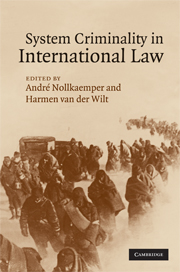Book contents
- Frontmatter
- Contents
- Preface
- Table of cases
- Table of treaties and international instruments
- List of abbreviations
- List of contributors
- 1 Introduction
- 2 The policy context of international crimes
- 3 Why corporations kill and get away with it: the failure of law to cope with crime in organizations
- 4 Men and abstract entities: individual responsibility and collective guilt in international criminal law
- 5 A historical perspective: from collective to individual responsibility and back
- 6 Command responsibility and Organisationsherrschaft: ways of attributing international crimes to the ‘most responsible’
- 7 Joint criminal enterprise and functional perpetration
- 8 System criminality at the ICTY
- 9 Criminality of organizations under international law
- 10 Criminality of organizations: lessons from domestic law – a comparative perspective
- 11 The collective accountability of organized armed groups for system crimes
- 12 Assumptions and presuppositions: state responsibility for system crimes
- 13 State responsibility for international crimes
- 14 Responses of political organs to crimes by states
- 15 Conclusions and outlook
- Index
13 - State responsibility for international crimes
Published online by Cambridge University Press: 08 October 2009
- Frontmatter
- Contents
- Preface
- Table of cases
- Table of treaties and international instruments
- List of abbreviations
- List of contributors
- 1 Introduction
- 2 The policy context of international crimes
- 3 Why corporations kill and get away with it: the failure of law to cope with crime in organizations
- 4 Men and abstract entities: individual responsibility and collective guilt in international criminal law
- 5 A historical perspective: from collective to individual responsibility and back
- 6 Command responsibility and Organisationsherrschaft: ways of attributing international crimes to the ‘most responsible’
- 7 Joint criminal enterprise and functional perpetration
- 8 System criminality at the ICTY
- 9 Criminality of organizations under international law
- 10 Criminality of organizations: lessons from domestic law – a comparative perspective
- 11 The collective accountability of organized armed groups for system crimes
- 12 Assumptions and presuppositions: state responsibility for system crimes
- 13 State responsibility for international crimes
- 14 Responses of political organs to crimes by states
- 15 Conclusions and outlook
- Index
Summary
Introduction
In the ILC Articles on State Responsibility, as they were taken note of by the General Assembly in 2001, the very term of ‘crimes’ is missing in the overall codification of the law of state responsibility. Even if the term as such has vanished, be it considered a positive or a negative development, it remains to be seen whether instances of ‘state criminality’ indeed do give rise to specific consequences when it comes down to the law of state responsibility, and if so, what consequences could arise.
Yet there exists, at least grosso modo, a significant overlap between the notion of ‘system criminality’ on the one hand, and that one remaining from the concept of state crimes in the ILC Articles on State Responsibility on the other, namely the concept of serious breaches of peremptory norms of international law, as provided for in Articles 40 and 41 of said articles. Therefore, for the sake of briefness, the term ‘state crimes’ will henceforth interchangeably be used, although there might exist some specific distinctions between the notion of ‘state crimes’, ‘serious breaches of peremptory norms’, and instances of ‘state criminality’.
- Type
- Chapter
- Information
- System Criminality in International Law , pp. 298 - 313Publisher: Cambridge University PressPrint publication year: 2009
- 1
- Cited by



